

DragonMech. Dragonmech is a steampunk/fantasy campaign setting for d20 fantasy developed by Goodman Games and Sword & Sorcery Studios.
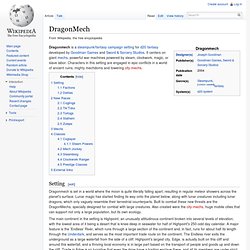
It centers on giant mechs, powerful war machines powered by steam, clockwork, magic, or slave labor. Characters in this setting are engaged in epic conflicts in a world of ancient ruins, mighty mechdoms and towering city-mechs. Setting[edit] Dragonmech is set in a world where the moon is quite literally falling apart, resulting in regular meteor showers across the planet's surface. Lunar magic has started finding its way onto the planet below, along with lunar creatures including lunar dragons, which only vaguely resemble their terrestrial counterparts.
The main continent in the setting is Highpoint, an unusually altitudinous continent broken into several levels of elevation, with the lowest area of it being a desert that is knee-deep in seawater for half of Highpoint's 250-odd day calendar. Eclipse Phase (role-playing game) Eclipse Phase is a science fiction horror[1] role-playing game with transhumanist themes.[2] Futurist Anders Sandberg noted its difference from GURPS Transhuman Space was its emphasis on posthuman (rather than transhuman) characters.[3] Originally published by Catalyst Game Labs,[4] Eclipse Phase is now published by the game's creators, Posthuman Studios and is released under a Creative Commons license.[5][6][7][8] In 2010, it won the 36th Annual Origins award for Best Roleplaying Game.[9] It also won three 2010 ENnie awards: Gold for Best Writing, Silver for Best Cover Art, and Silver for Product of the Year.[10] Earth is subsequently abandoned, and existing colonies throughout the Solar System are expanded to accommodate the refugees.
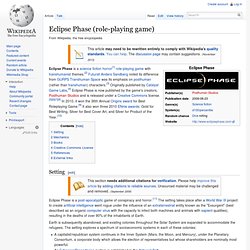
The setting explores a spectrum of socioeconomic systems in each of these colonies: With all of this, the game encourages players to confront existential threats like aliens, weapons of mass destruction, Exsurgent Virus outbreaks, and political unrest. The Elder Scrolls. The Elder Scrolls is a series of action role-playing open world fantasy video games primarily developed by Bethesda Game Studios and published by Bethesda Softworks.
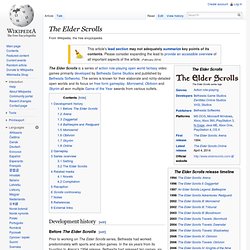
The series is known for their elaborate and richly-detailed open worlds and its focus on free-form gameplay. Morrowind, Oblivion and Skyrim all won multiple Game of the Year awards from various outlets. Development history[edit] Before The Elder Scrolls[edit] Prior to working on The Elder Scrolls series, Bethesda had worked predominately with sports and action games. En Garde! En Garde!

Is a role-playing game set in 17th century Paris. Players take the roles of gentlemen duellists. Tékumel. Tékumel is a fantasy world created by M.

A. R. Barker over the course of several decades from around 1940.[1] With time, Barker also created the role-playing game Empire of the Petal Throne, set in the Tékumel fictional universe, and first published in 1975 by TSR, Inc. In this imaginary world, huge, tradition-bound empires with medieval levels of technology vie for control using magic, large standing armies, and ancient technological devices. DragonRaid. DragonRaid is a Christian fantasy game that was created by Dick Wulf in 1984.
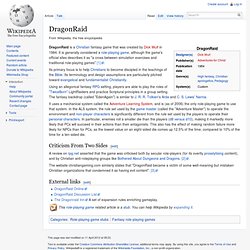
It is generally considered a role-playing game, although the game's official sites describes it as "a cross between simulation exercises and traditional role-playing games" [1]. Its primary focus is to help Christians to become discipled in the teachings of the Bible. Its terminology and design assumptions are particularly pitched toward evangelical and fundamentalist Christianity. Everway. Everway is a fantasy role-playing game[1] first published by Wizards of the Coast under their Alter Ego brand in the mid-1990s.
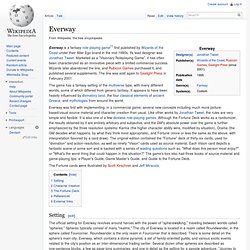
Its lead designer was Jonathan Tweet. Marketed as a "Visionary Roleplaying Game", it has often been characterized as an innovative piece with a limited commercial success. Wizards later abandoned the line, and Rubicon Games purchased it, and published several supplements. The line was sold again to Gaslight Press in February 2001. Everway was first with implementing, in a commercial game, several new concepts including much more picture-based/visual source material and character creation than usual.
The Dresden Files. Game[edit] The Dresden Files Roleplaying Game is written as an in-universe artifact; a draft of tabletop role-playing game written by Billy Borden in order to explain to both his werewolf pack and to mortals how the supernatural world works.
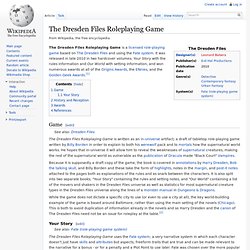
He hopes that in-universe it will allow him to reveal the weaknesses of supernatural creatures, making the rest of the supernatural world as vulnerable as the publication of Dracula made "Black Court" Vampires. Your Story[edit] The characters are assumed to know each other in advance, and character creation includes inventing a couple of stories in their shared past. Ex Machina (role-playing game) Ex Machina is a cyberpunk role-playing game published by Guardians of Order covering a range from classic cyberpunk to postcyberpunk.
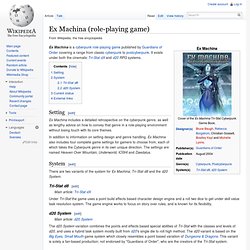
It exists under both the cinematic Tri-Stat dX and d20 RPG systems. Ex Machina includes a detailed retrospective on the cyberpunk genre, as well as lengthy advice on how to convey that genre in a role-playing environment without losing touch with its core themes. In addition to information on setting design and genre handling, Ex Machina also includes four complete game settings for gamers to choose from, each of which takes the Cyberpunk genre in its own unique direction. The settings are named Heaven Over Mountain, Underworld, IOSHI and Daedalus. Fading Suns. Game setting[edit] The action is set in a future medieval-analogue empire built on the remains of a previous, more sophisticated human galaxy-spanning civilization made possible by ancient "Jumpgates".
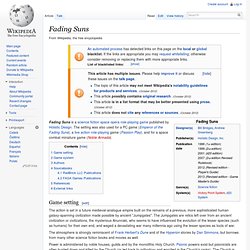
The Jumpgates are relics left over from an ancient civilization or civilizations, the mysterious Anunnaki, who seems to have influenced the evolution of the lesser species (such as humans) for their own end, and waged a devastating war many millennia ago using the lesser species as tools of war. Power is administered by noble houses, guilds and by the monolithic Holy Church. Psionic powers exist but psionicists are often hunted down and killed by the Church (or led back to orthodoxy and enrolled in the Church's ranks). EverQuest Role-Playing Game. History[edit] EQRPG was first published in summer 2002 under Wizards of the Coast's Open Gaming License using a system nearly identical to the d20 System; however, it was not d20 System branded because it included self-contained rules for character creation and advancement. [citation needed] In early 2005, a major revision in the form of the EverQuest II Player's Guide was released, which deviated even further from the d20 System.
[citation needed] A notable example is its approach to classes. There are only four character classes, called "Archetypes", available to starting characters. The EverQuest II Player's Guide did not contain rules for magic, though a free download at Sword & Sorcery's web site did give basic spells for low-level characters. Freelancers and customer service representatives have stated that future EverQuest RPG releases, if any, will have statistics for both the EverQuest and EverQuest II games, rather than being exclusively for one or the other. External links[edit] FASA. FASA Corporation is an American publisher of role-playing games, wargames and board games between 1980 and 2001, after which they closed operations for several years. In 2012, a new company called FASA Games went into operation, using the name and logo under license. The highly successful BattleTech line led to a series of video games, some of the first virtual reality gaming suites, called Virtual World (created by a subdivision of the company known at the time of development as ESP, an acronym for "Extremely Secret Project") and a Saturday-morning animated TV series.
Shadowrun. Setting[edit] In parallel with these magical developments, the setting's 21st century features technological and social developments associated with cyberpunk science fiction. Megacorporations control the lives of their employees and command their own armies; the ten largest have extraterritoriality, such as now enjoyed by foreign heads of state. Technology advances make cyberware (mechanical replacement body parts) and bioware (augmented vat-grown body parts implanted in place of natural organs) common. Renegade Legion. Set in the 69th Century, the series allowed gamers to play out the battles between the "Terran Overlord Government (TOG)", a corrupt galactic empire, and the "Commonwealth", an alliance of humans and aliens. The focus of the plot, like with many strategy games, is to present a long term conflict to enable as many individual situations and environments as possible.
Most of Renegade Legion deals with large, military battles to be played on hexagonal grid mapsheets in a turn-based rules system. The Plotline[edit] The setting can best fit into the space opera category. MechWarrior (role-playing game) MechWarrior is a role-playing game set in the fictional BattleTech universe in which players can assume the roles of MechWarriors (BattleMech pilots) or other individuals in the 31st century. The game has had three editions and many expansions and adventures, the first of which was published in 1986 by FASA Corporation.
In addition, numerous novels by such authors as Michael A. Earthdawn. Earthdawn Gamemaster's Compendium (RedBrick) Star Trek role-playing game (FASA) Crimson Skies. Crimson Skies logo. Crimson Skies is a media franchise and fictional universe created by Jordan Weisman and Dave McCoy. BattleTech. Classic BattleTech logo. Metaltech: Earthsiege. The Doctor Who Role Playing Game. Arduin. Against the Darkness. Amber Diceless Roleplaying Game. Continuum (role-playing game) Unlike other time travel games (and fiction), which usually depict time travelers as either lone explorers or as an all-powerful "time police", C°ntinuum assumes that time travelers (spanners) would eventually evolve their own society, with its own laws, rules, slang, groups, art movements, and the like. Blue Planet (role-playing game) Corporation (rpg) BattleDragons. Darwin's World. Bunnies & Burrows. Big Bang Comics (role-playing game) Cyborg Commando.
Demon's Lair. Deus Ex: Human Revolution. Dominion Rules. The Burning Wheel. Children of the Sun (role-playing game) Cursed Empire. Deliria. The Doctor Who Role Playing Game. Doctor Who – Adventures in Time and Space: The Roleplaying Game. Time Lord (role-playing game) Pinnacle Entertainment Group. Brave New World (role-playing game) Deadlands. Savage Worlds. Fantasy Flight Games. Black Industries. Warhammer Fantasy Roleplay. Through the Desert. Mag Blast. Dragonstar. Kingdoms (board game) Chaos Marauders. Runebound. War of the Ring (board game) Lord of the Rings (board game) Space Marines (Warhammer 40,000) Arkham Horror. Descent: Journeys in the Dark. A Game of Thrones (card game)
Warhammer: Invasion. Fireborn. Chaos Space Marines. Twilight Imperium. Wiz-War. Cosmic Encounter. Grimm (role-playing game) Anima: Beyond Fantasy. Beowulf: The Legend. Tide of Iron. Talisman (board game) StarCraft: The Board Game. Spectrum Games. Cartoon Action Hour. Omlevex. Blacksburg Tactical Research Center. CORPS. Timelords (role-playing game) Macho Women with Guns. EABA. Hollyworld.